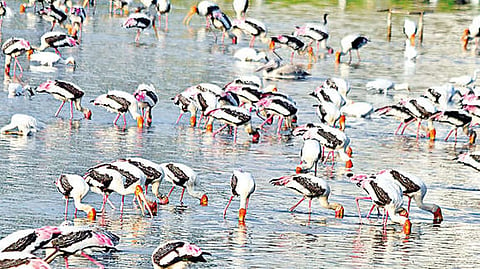

CHENNAI: Hundreds of birds and marine animals in India have been in decline for a decade and naturalists are fearing local extinction of animals.
Loss of habitats, overexploitation, pollution, threat of invasive species and zoonotic diseases will add to the existing climate change impact, warn biologists. Over the last half-century, global biodiversity has declined alarmingly. More than 25,000 species, or nearly one-third of all known species, are in danger of extinction.
Disappearance of elephants from hillocks adjoining north Tamil Nadu, absence of wild boar from Chennai, decrease in population of golden jackal and disappearance of dolphins from Chennai coast are all signs of climate change and local extinction warn, biologists and conservationists.
“Climate change plays a vital role in the decrease in the population of birds for a decade in India. Those regions which received intense rainfall are now experiencing drought, there is a change in the arrival of migratory birds. According to a report published by the State of India mentioned that many birds are in endangered, vulnerable category, whereas a few common bird species such as sparrow, peacocks maintained a steady population in the country,” says P Jeganathan, Scientist, Nature Conservation Foundation, Mysuru.
In India, vultures declined drastically by 99 per cent due to diclofenac used for injured animals, as the vultures feed on dead cattle it has poisoned them. After decrease in the bird, the drug is banned in the country and veterinary hospitals are using alternative medicines to treat the animals.
The remaining one per cent of vultures are spotted in Mudumalai region and a few areas in India. Similarly, the great Indian bustard has also declined due to lack of grassland in India.
“Secondly, there is continuous development activities in the coastal areas, birds are being trapped and killed. If this is an ongoing process, the county will lose at least 30 – 40 endangered and vulnerable bird species in the future,” explains Jeganathan, an ornithologist.
“Human activity, the use of fossil fuels, ocean acidification, pollution, deforestation and forced migrations jeopardise all life forms. One-third of all corals, freshwater mollusks, sharks, and rays, one-fourth of all mammals, one-fifth of all reptiles and one-sixth of all birds are thought to be on the verge of extinction,” says Dr A Kumaraguru, Conservation Scientist, Biodiversity Conservation Foundation.
Many organisms lost their home, as people occupied their places, which led to decrease in the population size. Elephants were once commonly seen over Kallakurichi, Ambur, Tiruvannamalai, Vellore, Senji, Arani that are part of Eastern ghats, but now the pachyderms are wiped out from this landscape and it is hard to spot them in these regions. “Similarly, spotting a dolphin near Cooum estuary - Marina beach stretch or Neelankarai beach was once common, but now marine mammals are missing along Marina coast due to high level of marine pollution, dumping of debris and plastics,” adds Kumaraguru.
However, there are also bio diversity hotspots like Pallikaranai, where bird watchers witnessed surprising numbers in the arrival of migratory birds. “Though during the monsoon period there were no migratory birds in Pallikaranai marshland, it was shifted to Nemilichery and Kelambakkam where the situation was compensated. The spot-billed pelican is one of the highest migratory populations in the city. Recently, Kelambakkam observed 800 migratory species, and Pallikaranai marshland had over 1,000 spot-billed pelicans,” explains Bird tracker and founder of The Nature Trust, KVRK Thirunaranan.
Nature is all about maintaining the cycle and studying the season changes. As per the observation over the decade, there is an increase among the migratory birds in Pallikaranai Marshland, Pulicat, and Kelambakkam. Even in recent days, four species of birds overstayed even after the season ended. Every year bird count is increasing and according to the rainfall there are ups and downs, Thirunaranan noted.
Visit news.dtnext.in to explore our interactive epaper!
Download the DT Next app for more exciting features!
Click here for iOS
Click here for Android